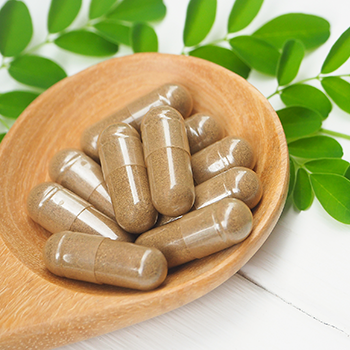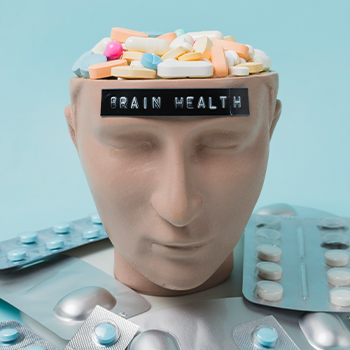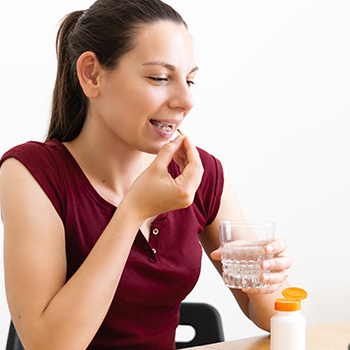Nootropics, also known as smart drugs, are a class of supplements and medications designed to improve cognition.
Students, professionals, and athletes use nootropics to improve energy levels, focus, and creativity.
There is a wide variety of nootropics on the market today, so I sat down with our nutritionist to break them down into different categories so you can better understand your options.
Read on to find out the types of smart drugs available.
Quick Summary
- The four types of nootropics are natural, synthetic, prescription, and over-the-counter, each offering different cognitive enhancement benefits.
- The decision to use nootropics involves assessing individual cognitive needs, researching suitable supplements, and consulting medical professionals for tailored advice.
- A PubMed study revealed that supplementing with fatty acids for 24 weeks significantly improved cognition in individuals with mild cognitive impairment.
- Personally, I believe the responsible use of nootropics, particularly natural ones, can be a valuable tool for cognitive enhancement and overall mental wellness.
What Are Nootropics?

Nootropics are cognitive enhancers, also known as smart drugs or memory-enhancing substances, used to improve mental function, increase energy, and boost creativity.
Nootropics can:
- Promote mental health
- Improve brain function
- Boost alertness
- Help treat ADHD
- Improve memory
- Manage symptoms of neurodegenerative disease or brain injury
- Stop the progression of cognitive decline related to dementia
Nootropics are available as dietary supplements and prescription drugs.
While nootropics are gaining popularity for their cognitive benefits, it's important to address the ethical and medical questions surrounding their use, especially stimulant nootropics, which have sparked a debate similar to the use of steroids in sports.
Let’s look at each type.
Types of Nootropics

I worked with our nutritionist to break Nootropics into four categories: natural, synthetic, prescription, and over-the-counter, so let’s take a quick look at each.
1. Natural

Nootropic dietary supplements usually consist of a combination of all-natural ingredients that can help balance brain chemistry and enhance cognition [1].
In my experience, natural nootropic supplements have noticeably balanced my brain chemistry and enhanced my cognition.
There are many types of all-natural ingredients that we will discuss now.
Herbal Extracts
Popular herbs in nootropic stacks include ashwagandha, Bacopa monnieri, Ginkgo biloba, and Panax ginseng.
Bacopa monnieri, for example, is a staple of traditional Ayurvedic medicine for its cognitive effects, according to the WebMD [2].
“Bacopa monnieri is an herbal supplement that has been shown to improve memory and information processing when taken for several months.”
- Erica Julson, M.S., R.D.N.
Amino Acids
Amino acids are crucial for brain health, aiding in both the growth of new brain cells and enhancing neuron communication.
Key amino acids found in nootropic supplements, such as L-tyrosine and acetyl-L-carnitine (ALCAR), are known for their cognitive benefits.
Additionally, creatine, a popular amino acid in these supplements, plays a vital role in energizing brain cells [3].
One systematic review shows creatine supplementation improves short-term memory and reasoning skills [4].
Cholinergic

Cholinergic compounds increase acetylcholine in the brain, which is critical for memory and learning.
Common cholinergic substances include alpha-GPC, huperzine-A, dimethylaminoethanol (DMAE), and citicoline (CDP-Choline) [5].
The compounds may improve overall mental performance and reduce age-related memory decline associated with dementia or Alzheimer’s disease.
Vitamins and Minerals
Vitamins and minerals help maintain proper organ health throughout our bodies and regulate neurotransmitters related to cognitive function. This process aids learning and working memory.
According to the Cureus,, B vitamins are a common addition to nootropic supplements, and studies link cognitive impairment to deficiency in this group of vitamins [6].
Zinc is another common addition for cognitive enhancement and general well-being [7].
Adaptogens
Adaptogens are natural substances that modulate how your body responds to stress.
These substances, like Rhodiola rosea, Ashwagandha, and Bacopa monnieri, can reduce stress hormones and promote relaxation, allowing focus even under stressful conditions [8].
2. Synthetic

Nootropics formulated in a lab are synthetic compounds not found in nature, though they may mimic the cognitive benefits of natural substances.
Having tried synthetic nootropics like racetams myself, I've observed they can offer cognitive benefits similar to natural substances, but with a more pronounced effect.
Racetams are a well-known class of synthetic nootropics that enhance behavior and cognition, based on the research published in PubMed [9].
Common examples of racetams are:
- Piracetam
- Sunifiram
- Phenylpiracetam
- Aniracetam
- Oxiracetam
- Nebracetam
Adrafinil is an over-the-counter synthetic nootropic included in some supplements.
Adrafinil is a stimulant, so many use it for increased alertness and energy, enhanced athletic performance, and weight loss [10].
Adrafinil is not to be confused with Modafinil, in a class of prescription stimulant medications called Eugeroics.
Modafinil use began in the 1990s to treat narcolepsy, obstructive sleep apnea, and shift work sleep disorder [11].
Related: What is Noopept?
3. Prescription
Prescription nootropics are a class of drugs with cognitive-enhancing properties prescribed by medical professionals to treat narcolepsy, Alzheimer’s, attention deficit hyperactivity disorder (ADHD), and Parkinson’s disease.
Commonly prescribed prescription nootropics include Donepezil (Aricept), Rivastigmine (Exelon), and Memantine.
These drugs seem to increase the availability of neurotransmitters like acetylcholine and dopamine in the brain, according to the Nutrients [12].
4. Over-the-Counter

Over-the-counter nootropics are a form of cognitive enhancers and brain supplements that people can purchase without a doctor’s prescription.
These products usually contain herbal extracts, vitamins, minerals, amino acids, and other compounds believed to support cognitive performance, brain health, and mental alertness.
In my experience, over-the-counter nootropics like fish oil and B vitamins have been accessible options for clients looking to enhance cognitive function without a prescription.
I covered prevalent amino acids, vitamins, minerals, and herbal extracts earlier when discussing natural nootropics, but there are a couple of other compounds worth mentioning.
PhosphatidylSerine
PhosphatidylSerine (P.S.) is a chemical called a phospholipid naturally found in cell membranes throughout the body, particularly the brain, and plays a vital role in cognitive function [13].
Omega-3
Fish, like mackerel, salmon, sardines, and anchovies, is the most common source of Omega-3 fatty acids. Fish oil is a common over-the-counter supplement of these vital brain-healthy fatty acids.
Research published in PubMed shows that supplementing with fatty acids for 24 weeks improved cognition in individuals with mild cognitive impairment [14].
“Omega-3 fatty acids play several important roles in your body. They have anti-inflammatory effects and are an essential component of your brain and eyes.”
- Kris Gunnars, B.S.c.
Different Uses

While some people look to nootropics as an overall cognitive enhancer, others have more specific needs to boost brain function.
Certain nootropics have shown promise in enhancing cognitive flexibility, a key aspect of executive functioning that allows us to adapt to changing environments and multitask effectively, as well as in aiding stress resilience and mood balance.
Let’s look closer at some common goals for people using nootropics.
1. To Increase Creativity
Creativity isn’t just an artistic expression but also problem-solving. Certain nootropics may increase one’s creativity levels.
A couple of examples of creativity-boosting nootropics include ALCAR and alpha-GPC.
From my coaching experience, I've found that nootropics like ALCAR can significantly enhance creativity, not just in arts but in everyday problem-solving too.
Acetyl-L-carnitine (ALCAR) is one of many amino acids that may indirectly boost creativity by reducing fatigue and increasing energy levels and mental alertness [15].
Alpha-GPC helps boost acetylcholine levels in the brain, enhancing cognition related to creativity, like memory formation and recall and verbal fluency [16].
2. To Boost Memory and Learning
Many of the natural compounds we discussed already promote better memory and learning function.
In my coaching, I've seen clients experience notable improvements in memory and learning, especially with supplements that boost acetylcholine levels.
You may remember these include:
- Citicoline
- Alpha-GPC
- ALCAR
- Zinc
Caffeine is another substance that increases acetylcholine levels and is a frequent addition to brain supplements.
According to the study published in PubMed, caffeine is the most widely consumed psychoactive substance naturally found in coffee, tea, and cocoa [17].
3. To Improve Focus and Concentration

Several herbal supplements date back thousands of years in traditional medicines like Chinese and Indian that promote focus and concentration.
In my practice, I've recommended herbal supplements like Ginkgo biloba to clients seeking improved focus and concentration, with positive feedback.
Ginkgo biloba is one such example; recent studies show it increases blood flow and, thus, oxygen to the brain, acts as an antioxidant, and may even stop the progression of dementia symptoms [18].
Rhodiola rosea is an herb native to Europe and Asia, and studies suggest it helps improve learning capabilities by reducing stress-related interference with the recall of information [19].
4. To Reduce Stress
People often turn to nootropics like Bacopa monnieri, a renowned adaptogen, for stress relief. Personally, I've found Bacopa monnieri to be highly effective in managing stress, a sentiment echoed by many of my clients.
Research published in Journal of Alternative and Complementary Medicine has shown that Bacopa monnieri is effective in alleviating stress, anxiety, and depression, alongside boosting cognitive function [20].
Additionally, the aforementioned Rhodiola rosea reduces stress and mental and physical fatigue [21].
L-theanine is an amino acid naturally found in green tea leaves. It possesses calming properties, promoting relaxation without sacrificing energy levels and simultaneously allowing users to be relaxed and alert.
How to Choose the Best for You

Before shopping for a nootropic supplement, ensure you eat a nutrient-rich diet and get plenty of rest.
Additionally, studies published in Primary Care Companion to the Journal of Clinical Psychiatry prove a consistent exercise routine will boost physical and mental health and brain performance [22].
Once you have diet, exercise, and sleep habits polished, it is time to start thinking about a nootropic supplement.
1. Assess Your Needs
First, you should assess your needs and goals to determine which nootropics will best help you.
In my role as a senior coach, I always start by assessing specific needs and goals, which has helped me and my clients find the most suitable nootropics.
For example, if your primary goal is to reduce stress symptoms that curtail cognitive function, Bacopa monnieri may be the ingredient to look for on the label.
If you are looking to boost memory and recall, Ginkgo biloba may be a better option because it may increase oxygen levels in the brain and has neuroprotective effects.
2. Research

Research the right supplement for your needs, considering potential side effects, allergen content, and compatibility with dietary preferences like veganism.
Pay attention to the dosage instructions to ensure it fits your daily routine.
3. Consult a Medical Professional
Finally, it is always advisable to consult your doctor before beginning any supplement, even if you are a healthy individual.
Your doctor can tailor advice to your health conditions and needs and discuss any potential medication interactions.
Following these steps will help you make an informed decision about a nootropic that will best help you meet your goals.
Based on my coaching experience, I always advise consulting a medical professional before starting any nootropic regimen, ensuring it aligns with your health needs.
References:
- https://www.medicalnewstoday.com/articles/326379
- https://www.webmd.com/vitamins/ai/ingredientmono-761/bacopa
- https://www.sciencedirect.com/science/article/pii/S092544390500133X
- https://pubmed.ncbi.nlm.nih.gov/29704637/
- https://examine.com/supplements/cholinergic/
- https://www.ncbi.nlm.nih.gov/pmc/articles/PMC7077099/
- https://pubmed.ncbi.nlm.nih.gov/17010236/
- https://my.clevelandclinic.org/health/drugs/22361-adaptogens
- https://pubmed.ncbi.nlm.nih.gov/8061686/
- https://www.webmd.com/vitamins/ai/ingredientmono-1644/adrafinil-%5Bfast-facts%5D
- https://www.ncbi.nlm.nih.gov/books/NBK531476/
- https://www.ncbi.nlm.nih.gov/pmc/articles/PMC9415189/
- https://www.webmd.com/vitamins-and-supplements/phosphatidylserine-uses-and-risks
- https://pubmed.ncbi.nlm.nih.gov/20434961/
- https://pubmed.ncbi.nlm.nih.gov/17658628/
- https://www.ncbi.nlm.nih.gov/pmc/articles/PMC4595381/
- https://pubmed.ncbi.nlm.nih.gov/2003276/
- https://www.webmd.com/vitamins-and-supplements/supplement-guide-ginkgo-biloba
- https://www.ncbi.nlm.nih.gov/pmc/articles/PMC6288277/
- https://www.ncbi.nlm.nih.gov/pmc/articles/PMC3153866/
- https://www.ncbi.nlm.nih.gov/pmc/articles/PMC9228580/
- https://www.ncbi.nlm.nih.gov/pmc/articles/PMC1470658/
About The Author
You May Also Like






